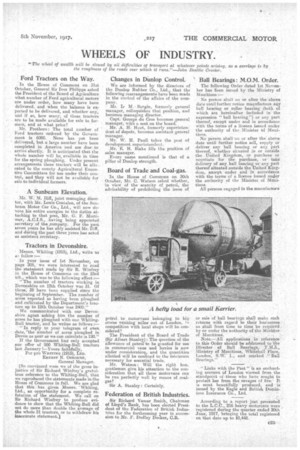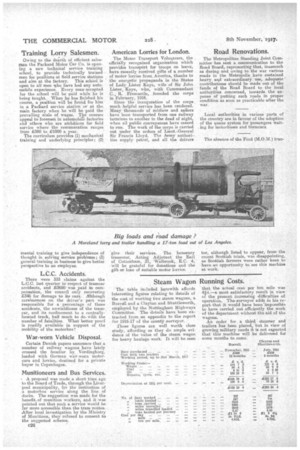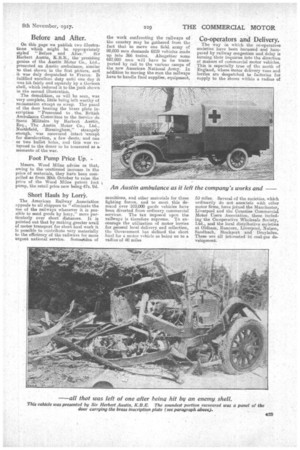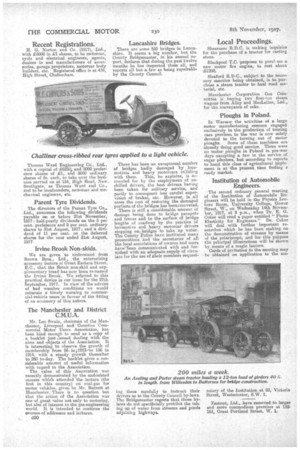WHEELS OF INDUSTRY.
Page 5

Page 6

Page 7

Page 8

If you've noticed an error in this article please click here to report it so we can fix it.
The wheel of wealth will be slowed by all difficulties of transport at whatever points arising, as a carriage is the roughness of the roads over which it runs."—John Beattie Crozier,
Ford Tractors on the Way.
. In the House of Commons on 31st October, General Sir Ivor Philipps asked the President of the Board of Agriculture what number of Ford agricultural motors are under order, how many have been delivered, and when the balance is esspected to be delivered, and whether any, and if so, how many, of these tractors are to be made available for sale to farmer's, and at what price?
Mr. Prothero : The total number of Ford tractors ordered by the Government is 6000. None has yet been delivered, but a large number have been completed in America and are dueto arrive shortly. It is anticipated that the whole number will be, available in time for the spring ploughing. Under present arrangements these tractot's will be allocated to the county Agricultural Executive Committees for use under their control, and they will not be available for sale to individual farmers.
• A Sunbeam Elevation.
• Mr. W. M. Iliff, joint managing three • tor, with Mr. Louis Coatalen, of the Sunbeam Motor Car Co., Ltd., will now devote his entire energies to the duties attaching to that post, Ills G. F. Mortimer, having being appointed. secretary of the ,company. For the past seven years he has ably assisted Mr. lliff, and -during the past three years has acted as assistant secretary.
Tractors in Devonshire.
Messrs. Whiting (1915), Ltd., write us as follow:— In your issue of let November, on page 205, we were interested to read the statement made by Sir R. Winfrey in the House of Commons on the 23rd ult., which was to the following effect :—
" The number of tractors working in Devonshire on 12th October was 51. Of these.; 35 have been supplied since the beginning of September. The number of aeres reported as having been ploughed and cultivated by the Department's tractors up to 12th October was 2400."
We communicated with our Devonshire agent asking him the num,ber of acres he has ploughed with one WhitingBull tractor, and he writes as follows :—
" In reply to your telegram of even .date,•the number of, acres ploughed in Devon as near as we can calculate is 120."
If the Government had only accepted our offer of 500 Whiting-Bull tractors last January,_1—Yours faithfully, Per pro WHITIN.G (1915), LTD.
ERNEST 'R. OSBORNE,
General Manager.
[So convinced were we of the gross injustice of. Sir Richard Winfrey's gratuitous reference to the Whiting-Bull, that we i reproduced the statements made n the Rouse of Commons in full. We are glad that this 'has given Messrs. 'Whiting, Ltd., an opportunity for a complete refutation• of the statement. We call on Sir Richard Winfrey to produce evidence to show that the Whiting-Bull did not do more than double the average of the whole 51 tractors or to withdraw his inaccurate statement)
Changes in Dunlop Control.
We are informed by the directors of the Dunlop Rubber Co., Ltd., that the following rearrangements have 'been made in the control of the affairs of the company.
Mr. Is M. Bergin, formerly general manager, relinquishes that position, and becomes managing director. Capt. George du Cros becomes general manager, with a seat on the hoard.
Mr. A. H. Hues formerly superintendent of depots, becomes assistant general manager.
Mr. W. H. Paull takes the post of development superintendent.' Mr. E. H. Blake fills the position of sales manager.
Every name mentioned is that of a pillar of Dunlop strength.
Board of Trade and Coal-gas.
In the House of Commons on 30th October, Mr. C. Watson asked whether, in view of the scarcity of petrol, the advisability of prohibiting the issue of petrol to mutervans belonging to big stores runising miles out of London, competition with local shops will be considered?
The President of the Board of Trade (Sir Albert Stanley): The question of the allowance of petrol to be granted for use in commercial vans and lorries is now under consideration, and the quantities allotted will be confined to the minimum necessary for essential trade. Mr. Watson: Will the right hon. gentleman give his attention to the consideration that all these raotorvans can be run perfectly well by means of coalgas?
Sir A. Stanley: Certainly.
Federation of British Industries.
Sir Richard Vassar Smith, Chairman of Lloyd's Bank, his been elected President of the Federation of British Industries for the forthcoming year in succession to Mr. F. Dudley Docker, C.B.
Ball Bearings: M.O.M. Order.
The following Order dated 1st November has Been issued by the Ministry of Munitions :— No person shall on or after the' above date until further notice manufacture any ball bearing or roller bearing (both. of which are hereinafter included in the expression " ball bearing ") or any part thereof, except under and in accordance with the terms of a licence issued under
the authority of the .Minister 'Munitions.
No person shall -on or after the aboVe date until further notice sell, supply of deliver any ball bearing or any part thereof, whether situated in or outside the United Kingdom, or purchase, or negotiate for the purchase, or take delivery of any ball bearing or any part thereof situated outside the United Kingsley!,' exceptunder and in accordance with the terms of a Emma issued under the authority of the Minister of Munitions.
All persons engaged in the manufactawe
or sale of ball bearings shall make such returns with regard to their businesses as shall from time to time 'berequired by or under the 'authority or the NI inisitei' of Munitions.
Note. —All applications' ••reference to this Order should be addressed to -the Director of Ball Bearings,:
Ministry of Mphitions, Whitehall Place, London, S.W. 1., and marked' "Ball Bearings,"
"Links with the Past" is an enchanting accoubt of London viewed from the standpoint of these who have sought to protect her from the ravages of -fire:" It is most beautifully produced, and is. issued by the Eagle and British Dominions Insurance Co., Ltd.
According to a report just presented to the L.C.C.,. 216 heavy motorcars were registered during the quarter ended 30th June, 1917, bringing the total registered. on that date up to 10,448.
Training Lorry Salesmen.
Owing to the de;rth of efficient salesmen the Packard Motor Car Co. is opening a new technical service training school, to provide technically trained men for positions at field service stations and aim at the factory_ This school is open to all men who have had any automobile experience. Every man' accepted for the school will be paid while he is being taught_ When he has finished his course, a position will be found for him in a Packard service station or at the main factory when be will be paid the prevailing sdale of wages. The courses appeal to foremen in autornobire factories and others who are ambitious for field service where the remuneration ranges
from £360 to £1000 a year. • • The curriculum provides (1) mechanical training and underlying principles; (2) mental training to give independence of thought in solving service problems; (3) general training in business to give better perspective to an employee.
L.C.C. Accidents.
There were 333 claims against the L.C.C. last quarter iii respect of tramcar accidents, and 23698 was paid in compensation, the council only recovering £346 for damage to its cars. Although carelessness on the driver's part was responsible for a percentage of these accidents, the unwieldineas of the tramcar, and its confinement to a centrally. located track, had much to do with the number of fatalities. What better proof is readily available in support of the mobility of the motorbus!
War-worn Vehicle Disposal.
Certain Danish papers announce that a number of railway wagons have lately crossed the frontier by Vordingborg, loaded with German war-worn motorcars and lorries, destined for a private buyer in Copenhagen.
Munitioneers and Bus Services.
A proposal was made a short time ago to the Board of Trade, through the Liverpool municipality, for the institution of a motorbus service along the line of docks. The suggestion was made for the benefit.of munition workers, and it was pointed out that such a service would be far more accessible than the tram routes, After local investigation by the Ministry of Munitions, they refused to consent to the suggested scheme.
American Lorries for London.
The Motor Transport Volunteers, the officially recognized organization which provides transport for troops on leave, have recently received gifts of a number of motor lorries from. America, thanks to the energetic propaganda in the States of Lady Lister Kaye, wife of Sir John Lister. Kaye, who, with Commandant C., R. Fremantle, founded the corps in February, 1916.
Since the inauguration of the corps much helpful service has been rendered. Many thousands of soldiers and sailors have been transported from one railway terminus to another in the dead of night, when all public conveyances have ceased to run. The work of the corps is carried out under the orders of Lieut.-General Sir Francis Lloyd. The As-my authorie ties supply petrol, and all the drivers
give their services. The honorary treasurer, Acting Adjutant the Earl of Cottenha.m, 31, -Walbrook, E.C. 4, will be grateful for donations and the gift or loan of suitable motor lorries.
Road Renovations.
The Metropolitan Standing Joint Committee-has sent a communication to the Road Board, representing that, inasmuch as during and owing to the war various roads in the Metropolis have sustained heavy and extraordinary use, adequate' contributions should be made out of the funds of the Road Board to the local authorities concerned, towards the expense of putting such roads in proper condition as soon as practicable after the war.
Local authorities in various parts of the country are in favour of the adoption of the queue system for passengers waiting for motorbuses and tramcars.
The absence of the Ford (M.O.M.) trac
tor, although listed to appear, from the recent Scottish trials, was disappointing, as Scottish farmers were rather keen to have an opportunity to see this machine at work.
Before and After.
On this page we publish two illustrations which might be appropriately styled "Before and After. ' Sir Herbert Austin, K.B.E., the presiding genius of the Austin Motor Co., Ltd., presented an Austin ambulance, similar to that shown in the first picture, anti it was duly despatched to France. It fulfilled excellent duty until one day it was hit fairly and squarely by a German shell, which reduced it to the junk shown in the second illustration.
The demolition, as will be seen was very complete, little being left wortiay of reclamation except as scrap. The panel of the door bearing the brass plate inscription "Presented to . the British Ambulance Committee to the Service de Sante Militaire by Herbert Austin, Esq. The Austin Motor Co., Ltd., Northfield, Birmingham," strangely enough, was recovered intact "'except for discoloration; a few dents, and one • or two bullet holes, and this was returned to the donor to he treasured as a.' memento of the war,
Foot Pump Price Up.
Messrs. Wood Milne advise us that, owing to the -contirnied increase in the price of materials, they have been compelled as from 20th October to raise the price of the Wood Milne patent foot pump, the retail price now being 47s. 9d.
Short Hauls by Lorry.
The American Railway Association appeals to all shippers to " eliminate the use of the railways whenever it is possible to send goods by lorry," more particularly over short distances. It is pointed out that by making greater avail of motor transport for short haul work it is possible to contribute very materially to the efficiency of the railways for more urgent national eervice. Somessidea of
the work confronting the railways of the country may be gathered from the fact that to move one field, army of 80,000 men demands 6229 vehicles made up into 366 trains. Altogether some 687,000 mum -will have to be transported by rail to the various camps of the new American National Army. In addition to moving the men the railways have to handle food supplies, equipment,
munitions, and other materials for these fighting forces, and to meet, this demand over .100;000 goods vehicles have been diverted from ordinary commercial services. The tax imposed upon the railways is therefore supreme. To encourage the utilization of motor lorries for general local delivery and collection, the Government has defined the short haul for a motoe vehicle as being an to a radius of 40 miles
Co-operators and Delivery.
The way in which the co-operative societies have been harassed and hampered by railway congestion and delay is turning their inquiries into the direction of makers of commercial motor vehicles. This is especially true of the north of England, where motor delivery vans and lorries are despatched to factories for supply to the stores within a radius of 50 miles. Several of the societies, which ordinarily do not associate with other motor firms, have joined the Manchester, Liverpool and the Counties Commercial Motor Users Association, these including the Co-operative Wholesale Society, Ltd., and the local distributive societies at Oldham], Runcorn, Liverpool, Nelson, Sandbach, Stockport and Droylsden. These are all interested in coal-gas development.
Recent Registrations.
II. G. Norton and Co. (1917), Ltd., with £5000 in £1 shares, to be motorcar, cycle and electrical engineers, agents, dealers in and manufacturers of accessories, garage proprietors, motorcar body builders, etc. Registered office is at 416, High Street, Cheltenham.
Thomas Ward Engineering Co., Ltd., with a capital of £6250., and 5000 preference shares of £1, and 5000 ordinary shares of 5s. each, to take over the business carried on at 134, High Road, New. Southgate, as Thomas Ward and Co., and to be ironfounders, motorcar and mechanical engineers, etc.
Parent Tyre Dividends.
The directors of the Parent Tyre Co.., Ltd. announce the following thvidencla
• pays:ble on or before 21st November, 1017: half-yearly dividends on the 5 per cent, preference and 8 per cent, ordinary shares to 31st August, 1917; and a dividend of 11 per cent. on the deferred shares for tho sear ended 31st August, 1917.
Irvine .Brook Non-skids.
We are given to understand from Brown Bros., Ltd. the enterprising
accessory factors of Ltd., Eastern Street, E.C., that the Brook non-skid and supplementary tread has now been re-named the Irvine Brook. We referred to this practical device in our issue for the 27th September, 1917. in view of the advent of bad weather conditions we would reiterate a timely warning to corrunercial-vehicle users in favour of the fitting of an accessory of this nature.
The Manchester and District • C.M.U.A.
Mr. Leo Swain, chairman of the Manchester, Liverpool and' Counties Commercial Motor Users Association, has been kind enough to send us a copy of a booklet just ,issued dealing, with the aims and objects of the Assoi iation. It is interesting to observe the growth of membership from 56. ina1913ato 136 in 1914, with a steady growth thereafter to 260 to-day. The booklet elves a considerable amount of useful Information with regard to the Association. The value of this Association VW recently demonstrated by the undoubted success which attended the lecture (the first in this country) on coal-gas for motor vehicles, given by Mr. Barrett at :Manchester. There is no question but that the action of the Association was one 'of. great nalue not only to motoring, but also of interest to the gas-engineering world. It is intended to continue the courses of addresses and lectures.
030 •
Lancashire Bridges.
There are some 550 bridges in Lancashire. It seems a big number, but the County Bridgemaster, in his annual report, declares that during the past twelve months he has inspected them all1 and reports all but a few as being repairable by the County Council.
There has been an exceptional number of bridges badly damaged by locomotives and heavy motorcars co:liding
with them. This, he explains, is accounted for by the employment of unskilled drivers, the best drivers having been taken for military service, and partly to consequent less careful supervision of brakes, etc. However, in all cases the cost of restoring the damaged portions of the bridges has been recovered. There is still a considerable amount of damage being done to bridge parapets and fences and to the surface of bridge lengths of roadway by the practice of locomotive and heavy motorcar drivers stopping on bridges to take up water. The County Police have instituted many prosecutions and the secretaries of all the local associations of owners and users have—been communicated with and furnished with an adequate supply of circulars for the use of their members request
ing them carefuliy to instruct their drivers as to the County Council by-laws. The Bridgemaster regrets that those bylaws do not specificially prohibit the taking up of water from streams and ponds adjoining highways.
Local Proceedings.
Sheerness R.D.C. is making inquiries for the purchase of a tractor for carting stone.
Blackpool T.C. proposes to purel.ase a new motor fire engine, to cost about £1200.
Sleaford R.D.C., subject to the necessary sanction being obtained, is to purchase a steam tractor to haul road material, etc.
Manchester Corporation Gas Committee is buying tWo four-ton steam. wagons from Alley and MacLellan, Ltd., for the conveyance of coke.
Ploughs in Poland.
In Warsaw the activities of a large motor manufacturing concern engaged exclusively in the production of touring cars previous to the war is now solely devoted to the turning out of motor ploughs. Some of these machines are already doing good service. There were . no motor ploughs in Poland in pre-war days excepting a few in the service of sugar planters, but according to reports to. hand this class of agricultural implement is at the present time finding a ready market.
Institution of Automobile • Engineers.
The second ordinary general meeting of the Institution of Automobile Engineers will. be held in the Physics Lecture Room, University College, Gower Street, W., on Wednesday 14th Novem. ber, 1917, at 8 p.m., when Dr. E. G. Coker will read a paper entitled " Photo Elasticity for Engineers." Dr. Coker will deal, with further important researches which he has been making on the demonstration of stresses by means of thepolariscope, and for this purpose • the principal' illustrations will be shown by means of a magic lantern. Cards of invitation to the meeting may be obtained on application to the -sec rotary of the Institution at 28, Victoria Street, Westminster, S.W. 1.
Fastnut, Ltd., have removed to larger and more commodious premises at 159161, Great Portland Street, W. 1.






















